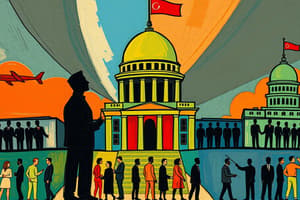Podcast
Questions and Answers
What is democracy?
What is democracy?
A form of government, a system of selecting policymakers, and a way of organizing government so that policy represents and responds to the public's preferences.
What is dictatorship?
What is dictatorship?
A form of government in which one person controls all aspects of governing, the general population has little or no political participation, and their rights are restricted.
What is direct democracy?
What is direct democracy?
System or process that depends on the voice of the people (and not representatives) to make public policy decisions.
What is elite and class theory?
What is elite and class theory?
What is hyper pluralism?
What is hyper pluralism?
What is indirect democracy?
What is indirect democracy?
What are linkage institutions?
What are linkage institutions?
What is monarchy?
What is monarchy?
What is oligarchy?
What is oligarchy?
What is pluralist theory?
What is pluralist theory?
What is a policy agenda?
What is a policy agenda?
What are policy-making institutions?
What are policy-making institutions?
What is political socialization?
What is political socialization?
What is public policy?
What is public policy?
What is representative monarchy?
What is representative monarchy?
What is a republic?
What is a republic?
What is traditional democratic theory?
What is traditional democratic theory?
What is Leviathan?
What is Leviathan?
What is Magna Carta?
What is Magna Carta?
Flashcards are hidden until you start studying
Study Notes
Key Concepts of Government
- Democracy: Government where policymakers are elected, and policies reflect public preferences.
- Dictatorship: A government system where one individual holds total control, limiting citizens' political participation and rights.
- Direct Democracy: Citizens directly influence policy decisions through referendums and initiatives rather than through representatives.
- Elite and Class Theory: Suggests societies are divided by class, with an upper-class elite governing regardless of any formal governmental structure.
- Hyperpluralism: Argues that the dominance of numerous strong groups weakens government effectiveness, representing an extreme form of pluralism.
- Indirect Democracy (Representative Democracy): Voters elect representatives who make decisions on their behalf, reflecting the people's sentiments.
- Linkage Institutions: Mechanisms, such as elections, political parties, and interest groups, that connect issues and public preferences to the government’s policy agenda.
Forms of Governance
- Monarchy: Power rests with a single ruler who claims authority as divinely ordained, typically passed down through generations.
- Oligarchy: Governance by a restricted group, often resulting in limited rights and participation for the general populace.
- Pluralist Theory: Emphasizes political competition among diverse groups, each advocating for their preferred policies.
- Republic: A system where power is derived from the people, who elect representatives accountable to them, contrasting with direct democracy.
- Representative Monarchy: The monarch functions as a ceremonial leader with power shared with elected representatives, ensuring citizen participation in government.
Policy and Political Process
- Policy Agenda: Comprises issues and problems receiving significant attention from government officials and their associates at any given time.
- Policy-Making Institutions: Entities that address political problems by interpreting voter needs and taking action, also known as the "Policy-Making Cycle."
- Political Socialization: The process by which individuals develop their political beliefs and orientations, influenced by their environment and education.
- Public Policy: Decisions made by the government to address political issues, shaping actions and responses to societal problems.
Historical Context
- Traditional Democratic Theory: Robert Dahl outlines core principles for democratic decision-making, including equality in voting and effective participation.
- Leviathan: Thomas Hobbes’ influential work advocating the necessity of government for security, requiring individuals to relinquish some natural rights.
- Magna Carta: A foundational document limiting the powers of the English monarch and affirming certain rights for the barons, marking an early step in constitutional governance.
Studying That Suits You
Use AI to generate personalized quizzes and flashcards to suit your learning preferences.




